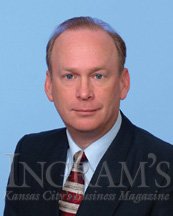sales & marketing
by kendall cobb

At a recent meeting of the Business Marketing Association in Kansas City,
a presenter from Denver, George Dennis, effectively convinced the attendees
that they should be more alert to what they give away at trade shows.
Dennis is a corporate intelligence expert who has personally gathered
tremendous amounts of information from companies at trade shows. It’s
another tool that corporate intelligence ‘spies’ use to learn
more about your business.
Business intelligence operations are a fact of life. Today about one-third
of Fortune 500 companies maintain funded and staffed intelligence departments—triple
the number from 1996.
Trade shows, where the purpose of the show is to put information out in
the open, provide a unique supermarket of facts and figures for competitors.
At this supermarket, trained collectors get fresher and more varieties
of information from people with first-hand experience than they could
ever get from a brochure or phone call.
And, done correctly, business intelligence is legal, ethical, and undetectable.
It’s done every day.
Corporate intelligence workers begin the process by pre-trade show planning.
During the first planning meeting, product managers, technical specialists
and marketers meet. What comes out of the meeting is a list of desired
information.
At the same time, these product managers and market strategists decide
what is not going to be revealed about themselves. We have found that
most manufacturers have no idea that they have secrets others may want.
But corporate intelligence experts do.
There will be several tasking meetings to refine the questions, making
sure the information isn’t already known within the company. At the
same time, a collector team is formed. The team picks through the floor
plan, speaker list, and exhibitor personnel, pre-registered and press
attendee lists. Team members call their friends and former colleagues.
What they’re looking for are the most likely people to know the desired
facts. They’re also boning up on all the target companies’ press
materials, Web sites, chat groups, financial and personnel news. Does
a competitor have a press conference scheduled? What’s it all about?
Has the collector team cultivated a press contact to attend for them?
Travel day, and the game begins at the airport. No logo wear. Check the
frequent flyer club, the restaurants and ticket lines because interesting
sources are all over.
When the show starts, the work continues. In a panel room, one collector
goes to the end of the line that rushes up to a targeted speaker, noting
badges and listening to the questions being asked. When the collector’s
turn comes, a simple thank you for a stimulating talk may be all it takes
for an exchange of cards—perhaps an invitation for drinks or dinner.
Another collector, who happens to be a guest speaker herself, heads for
the speakers’ lounge. In this cozy environment, invited ‘experts’
regularly share confidential information amongst themselves because they
are, well, experts.
As you can see, your plans to promote your company at a trade show can
have adverse side effects. Our experience shows that salespeople love
to talk and they let their guard down when they are away from the office.
Careful companies don’t let their guards down though. They work to
understand the traps that are out there, and to educate their sales and
marketing sales people about what information is not to be revealed, under
any circumstances. They will be joining their colleagues for additional
training and information-control procedures, all in the name of today’s
jobs and tomorrow’s profits.
Kendall Cobb is a project director for Missouri Enterprise and
is the current president of the Kansas City chapter of the Business Marketing
Association. He may be reached by phone at 816.482.1192 or by e-mail atkcobb@mebac.umr.edu.